



ERα rabbit pAb
 One-click to copy product information
One-click to copy product information| 50 µL | $148.00 |
| 100 µL | $248.00 |
Overview
-
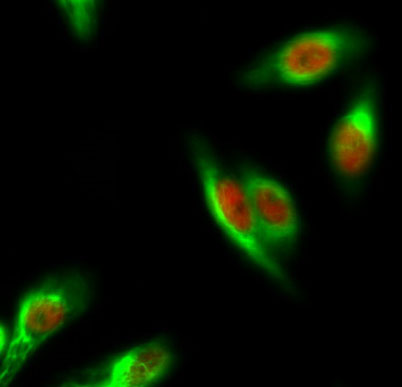 Immunofluorescence analysis of Hela cell. 1,ERα Polyclonal Antibody(red) was diluted at 1:200(4° overnight). Caspase-8 Monoclonal Antibody(2G12)(green) was diluted at 1:200(4° overnight). 2, Goat Anti Rabbit Alexa Fluor 594 Catalog:RS3611 was diluted at 1
Immunofluorescence analysis of Hela cell. 1,ERα Polyclonal Antibody(red) was diluted at 1:200(4° overnight). Caspase-8 Monoclonal Antibody(2G12)(green) was diluted at 1:200(4° overnight). 2, Goat Anti Rabbit Alexa Fluor 594 Catalog:RS3611 was diluted at 1 -
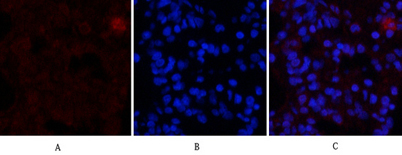 Immunofluorescence analysis of rat-lung tissue. 1,ERα Polyclonal Antibody(red) was diluted at 1:200(4°C,overnight). 2, Cy3 labled Secondary antibody was diluted at 1:300(room temperature, 50min).3, Picture B: DAPI(blue) 10min. Picture A:Target. Picture B:
Immunofluorescence analysis of rat-lung tissue. 1,ERα Polyclonal Antibody(red) was diluted at 1:200(4°C,overnight). 2, Cy3 labled Secondary antibody was diluted at 1:300(room temperature, 50min).3, Picture B: DAPI(blue) 10min. Picture A:Target. Picture B: -
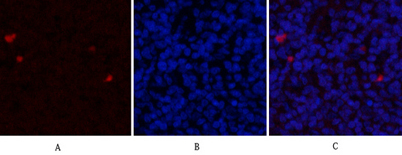 Immunofluorescence analysis of rat-spleen tissue. 1,ERα Polyclonal Antibody(red) was diluted at 1:200(4°C,overnight). 2, Cy3 labled Secondary antibody was diluted at 1:300(room temperature, 50min).3, Picture B: DAPI(blue) 10min. Picture A:Target. Picture
Immunofluorescence analysis of rat-spleen tissue. 1,ERα Polyclonal Antibody(red) was diluted at 1:200(4°C,overnight). 2, Cy3 labled Secondary antibody was diluted at 1:300(room temperature, 50min).3, Picture B: DAPI(blue) 10min. Picture A:Target. Picture -
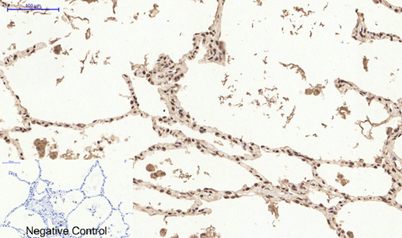 Immunohistochemical analysis of paraffin-embedded Human-lung tissue. 1,ERα Polyclonal Antibody was diluted at 1:200(4°C,overnight). 2, Sodium citrate pH 6.0 was used for antibody retrieval(>98°C,20min). 3,Secondary antibody was diluted at 1:200(room tempe
Immunohistochemical analysis of paraffin-embedded Human-lung tissue. 1,ERα Polyclonal Antibody was diluted at 1:200(4°C,overnight). 2, Sodium citrate pH 6.0 was used for antibody retrieval(>98°C,20min). 3,Secondary antibody was diluted at 1:200(room tempe

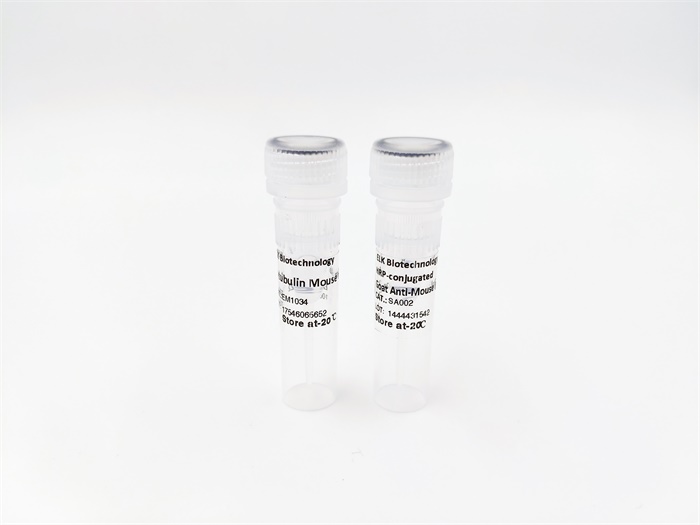
 Manual
Manual